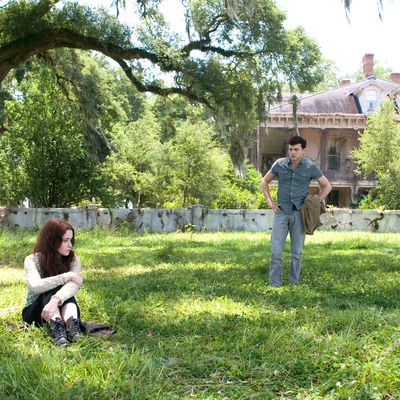
Richard Lagraveneses adaptation of the YA supernatural romance novel Beautiful Creatures is deliciously overripe; it plays like Twilight with a fat dose of Bell, Book, and Candle (or its high-camp TV analog, Bewitched). In the role of Ethan Wate, the mortal hero, Alden Ehrenreich is a fascinating hybrid; he has Leo DiCaprios heavy brow and Jack Nicholsons vaulting brows, as if the stars had mated on the set of The Departed. This lovelorn joker reads Slaughterhouse-Five, Tropic of Cancer, and other banned books that elicit murmurs of disapproval in a rural South Carolina high school full of Bible-bearing cheerleaders. Then, one day, a dark-haired girl, Lena Duchannes (rhymes with rain), arrives reading  wait for it  Charles Bukowski. Instantly you intuit the couples destiny: love, marriage, rehab.
In the book by Kami Garcia and Margaret Stohl, Ethan and LenaÔÇÖs first car ride is awkward and not particularly auspicious. LaGravenese turns it into a screwball volley that would make Preston Sturges tip his yachting cap. He asks if Bukowski is good, and she says, ÔÇ£Define good.ÔÇØ The encounter ends when Lena fends off EthanÔÇÖs request to see the inside of her uncleÔÇÖs antebellum manse, Ravenwood: ÔÇ£I donÔÇÖt feel like being the haunted-house attraction today.ÔÇØ But Ethan has a thing for haunted houses. He has visions of a woman wailing and raging on a hillside amid a Civil War battle, the woman like Lena, the manor like Ravenwood. It stands to reason he must be ÔÇö┬ámutatis mutandis┬áÔÇö the soldier on the ground with the bullet holes. This is obviously a saga that will span centuries, not to mention sequels and prequels.
Lena is played by Alice Englert, daughter of Aussie art-house darling Jane Campion and a thoughtful, self-contained actress ÔÇö she grows on you. (Also, her eyeliner grows on her ÔÇö IÔÇÖm guessing the filmmakers fiddled with her look over the course of shooting.) You donÔÇÖt cast Jane CampionÔÇÖs kid if your intentions are lowly (or lowbrow), and LaGravenese ÔÇö whose excellent rat-a-tat psychodramas include Living Out Loud and the screenplays for The Fisher King and The Ref┬áÔÇö is all in. Englert and Ehrenreich donÔÇÖt just stare dopily at each other, practicing Mormon forbearance. TheyÔÇÖre grabby ÔÇö and gabby. They talk about, like, ideas. The most worrisome thing is LenaÔÇÖs temper, which manifests itself like lightning strikes and rain showers focused exclusively on one person. Indeed, the grown-ups know that if these kids get together seriously, something very bad will happen ÔÇö either now or in the sequels and prequels.
   
Jeremy Irons and Emma Thompson play ÔÇ£castersÔÇØ (i.e., spell-casters) dueling over LenaÔÇÖs fate. Macon Ravenwood ┬¡(LenaÔÇÖs uncle) is icy, sallow, thin-lipped, every line withering into a sardonic sigh. Sarafine Duchannes is cackling, hooting, high on the hog ÔÇö and since Sarafine uses the body of EthanÔÇÖs best friendÔÇÖs prim mother, Thompson gets to overact in two distinct styles. The pair face off in a church. At issue is the point in a casterÔÇÖs life ÔÇö it seems to come a short time after the arrival of boobs or pubes ÔÇö when a certain curse kicks in and the dark side takes over. LenaÔÇÖs mom went dark. So did LenaÔÇÖs good-girl cousin (Emmy Rossum), who now wears black lace and corsets and makes like Rita Hayworth and Marilyn Monroe. I frankly didnÔÇÖt see the problem vis-├á-vis the dishy cousin, but the curse will supposedly spell trouble for Ethan and Lena. Perhaps the housekeeping supernatural librarian can advise. SheÔÇÖs played by Viola Davis, for whom LaGravenese merged two roles, proving prominent black actresses are no longer confined in big-studio pictures to domestics or fortune-tellers for white people. They can play domestics who are also fortune-tellers for white people!
   
I enjoyed this piece of southern-fried screwball Gothic whimsy (with jolts of CGI spell-casting for the multiplex crowd) so much that IÔÇÖm sad to admit that itÔÇÖs nowhere near as potent as Twilight. IÔÇÖm hardly a Twi-hard: I remember my bafflement at New Moon when all those texting teenage girls were suddenly mesmerized by a movie that moved at the speed of a tectonic plate, greeting Edward the Ruby-Lipped Effigy and Jacob the Human Muscle Chart with shrieks dissolving into moans and giddy whispers. But writer Stephenie Meyer got hold of something creepy in American (not just Mormon or Catholic) culture ÔÇö what happens when waves of erotic longing collide with waves of shame and body horror. Beautiful Creatures isnÔÇÖt pure camp ÔÇö thereÔÇÖs some real emotion in there. But not enough to hit you on a primal level. Can a movie in this florid genre pack a wallop if itÔÇÖs too cool for Sunday school?


